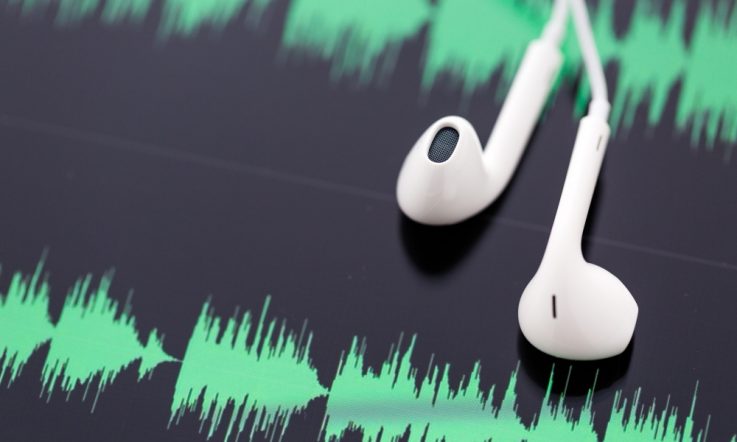Thank you for downloading this episode of Teacher Staffroom – where we catch you up on the latest evidence, insight and action. I'm Jo Earp.
Welcome to the first episode of a new series. Our podcast subscribers have told us that they love the option to listen (and learn of course) during the daily commute, while they're out for a walk, taking a break with a cuppa and even doing the household chores (apparently we make a particularly good soundtrack for cooking and hanging out the washing). So, with that in mind, we've decided to introduce another way for you to catch up with all things Teacher.
Teacher Staffroom is a chance for you to take some time out, on your own or with colleagues, to reflect on some of the content we've covered here at Teacher recently. We want you to join us on our learning journey by sharing your thoughts, questions and the impact on your own classroom practice. You can get in touch via Twitter, Facebook, or by posting a comment in the transcript of this podcast on our website – that's teachermagazine.com.au. Okay on with Episode 1.
There's been the usual smorgasbord of topics – ICT literacy, picture books and memory maps in the Early Years, STEM learning, parent-school relationships and student wellbeing – but leadership has been a strong recurring theme.
In a Q&A article, experienced principal Pauline Kubat shared her insights on the role. Interestingly, she's been principal of both Victoria's smallest and largest schools, and Pauline explained to us that collaboration has been constant throughout her 30 year career. She had this to say about her personal approach to leadership:
‘I am very much a collaborative leader in that I want people to be able to add their ideas and contribute to our decisions. Of course there is a difference between people actually knowing what can be done and what they would like to be done in terms of allocating money, journeys to take, approaches to implement. It is up to me to get the right people on board the bus, in the right seats for their skills and then to navigate us to the end destination. I don't ask my staff to do things that I wouldn't do and I lead by example. I model the values and have high expectations of myself and others.'
This week (yesterday in fact) saw the release of the annual Australian Principal Occupational Health, Safety and Wellbeing Survey results. Chief investigator, Associate Professor Philip Riley, says 2018 data show principals, and assistant and deputy principals, are under attack. A couple of the headline figures from the report include: instances of physical violence toward principals jumped from 27 per cent in 2011 to 37 per cent in 2018; and 53 per cent of survey participants said they worked more than 56 hours per week during the school term (another 24 per cent said it was actually 61-65 hours per week). Our long read article this month goes through the latest findings and recommendations, and there's also a link in there to the full report if you'd like to read more.
Now, regular podcast listeners will have heard our series on School Improvement. In our February episode, Rebecca Vukovic caught up with Craig Heeley from the UK. He landed his first Head Teacher role at the beginning of the year and he's been sharing his journey since then via Twitter. In one Tweet he mentioned he was meeting one-to-one with every single member of staff (teaching and non-teaching). Here's Craig explaining why that was a priority for him:
‘So it was partly that I thought it was important that they got to know me on a one-to-one basis rather than in a large group, so that they felt more comfortable to kind of talk and ask questions. I think as well, I think it's really important that everybody at the school knows that they're part of the team and that they're all valued and that they all play a massive role to ensure that our children get the best experience when they're at school.
I think as leaders, the school leaders, we make important decisions, we make the big decisions but everybody else has got to play their part and if they don't do their job or if they don't feel valued and they don't feel included, then I don't think we're going to give the best deal to our children. And in terms of the one-to-one conversations, I was really keen to get everybody's unique perspective on what our school does well, where we might do things differently or better. And that's exactly what they did.'
New Head Teacher Craig Heeley there. Now, it's well known that effective staff collaboration can help teachers improve their own practices, and ultimately of course student outcomes. Maningrida College is a P-12 in Northern Arnhem Land, in Northern Territory. The 500ks to Darwin is a long trip if you're looking to access external professional learning in the city. In a short article this month, principal Daryll Kinnane told us how the school is developing a Professional Learning Community – this includes growing their own experts and planning in time for teachers to visit other classes and get involved in peer feedback.
Still on the topic of feedback and reflection, Learning Leader Rachael Williams got in touch with a reader submission about a form of professional learning she described as ‘akin only to reading the diary I kept as a teenager, both fascinating and excruciating in equal measure' – that's being videoed teaching and watching the footage back. Don't worry though, it's not a harrowing read – Rachael explains that the diplomacy of her school's teacher consultant and support of her colleagues made it a very positive experience! Reflecting on the process she says in the article:
‘One of the most surprising outcomes of watching myself teach came from the conversations I had with students afterwards. The students laughed when I shared the nausea I felt right before the clip was shown and my horror at those first few shrieky seconds. And afterwards, my students saw me as both a teacher and a learner and know that I have teaching and learning goals that I am working towards. It is important to me that students understand that I expect their very best effort in the classroom and that I expect no less of myself. That they, and I, will make mistakes but we will work together to learn from them.'
Thanks to Rachael for sharing her own experience with Teacher readers. If you want to do the same and submit an article, we've put together a brief guide for contributors. Scroll down to the footer on our website and click on ‘How to Get Involved' to access this quick guide. It's also worth having a look at the Reader Submissions section on our site – that's on the drop down menu under Articles.
Okay, enough of the housekeeping then, back to the review. Sharing research and data is an important part of what we do here at Teacher. One of the ways we do it is through infographics. Our two topics for February were: ICT Literacy of students in Australia (spoiler alert – females continue to outperform their male counterparts); and student motivation in schooling. Now, the student motivation infographic takes a look at some of the results from a UNICEF of Australia national survey of secondary students. The good news is 85 per cent of those surveyed said they were positively motivated in relation to their schooling. As to some of the motivating factors? Well, 65 per cent saw school as an opportunity to get into a uni and 63 per cent said they wanted to do well to make their parents proud. Almost half said they felt positively about school because of their friends and, if you're considering introducing a lunchtime activity or afterschool club consider this stat – extracurricular activities such as sport, music and drama represented positive motivation for 40 per cent of the 1001 14- to 16-year-olds who were surveyed.
A reminder that you can visit our infographic archive on the Teacher website, and they're all available to download as PDF versions, with hyperlinks, from the ACER Repository.
Switching formats, but staying with research findings, in this month's episode of our podcast series The Research Files, I caught up with Dr Joann Fildes to talk about using survey data to inform student wellbeing planning. Joann is Head of Research and Evaluation at Mission Australia. Every year the charity carries out a national Youth Survey of 15- to 19-year-olds. In one of the questions, students were asked about issues of personal concern. According to the latest survey, the top three areas of personal concern are stress (number one), school or study problems (number two) and mental health came in at number three. Given that around one-third of those surveyed said they'd turn to a teacher or a school counsellor for help, I asked Joann what educators and schools can do.
‘I think sometimes it's knowing the difference between what's a ‘normal' stress – you know, exams are obviously very stressful, leaving school is very stressful – and what can be more important, what are those important concerns that young people have, what are the signs and symptoms. So, for schools to teach young people around those issues around mental health.
We know that they go to their friends. Making sure their friends know where to go to for help. Lots of schools are teaching Mental Health First Aid within schools and having a Mental Health First Aid Officer within the schools. They're really important for young people to feel that they can go to those sources of support within schools. And I think it is for their friendship groups, to know where to go to for help. Because, as you quite rightly say, over 85 per cent of them are going to their friends first. So, do those friends know where to go to for help and where they can go to within the school environment?'
That was Dr Joann Fildes there from Mission Australia, talking about student mental health. Student and teacher welfare is a topic that readers and listeners tell us they want more support and information on. We have four regular columnists here at Teacher. In her first column of the year this month, Julia Gillard shared details of a new, national mental health initiative from Beyond Blue – and that's available for free to every school and early learning service in Australia. She writes:
‘The initiative spans mental health promotion, prevention, early intervention and also provides a critical incident response service in the event of a suicide. The Be You initiative has been designed for educators at every level – from those training to become a teacher to our most experienced principals, teachers and early learning staff. Educators have told us this is what they need. They said they needed extra help with practical tools, advice and support when children and young people were struggling.'
I mentioned earlier those stats from the UNICEF survey about the positive impact of extracurricular activities. This month has seen the launch of the 2019 Australian STEM Video Game Challenge. Managed by the ACER Foundation, it's a great way to engage students in an authentic learning activity. Some schools choose to run it as a lunchtime or an after school activity and some embed it into the curriculum. It's open to students in Years 5-12 and the challenge is to design and create an original video game. Dr Grant Pusey, from Churchlands Senior High School in Western Australia, has been teacher mentor to winning student teams for the last three years. In our article we share how you don't need to be an expert in game development to mentor a team of students – there's a mentor handbook, there's a teacher learning pack and loads more information on the challenge website (that's stemgames.org.au). Grant tells us being a mentor is much easier than it sounds, and he says:
‘Mentoring students through the process of the Australian STEM Video Game challenge offers students another perspective of who I am. I'm able to share my passion for Physics, coding and games with students, rather than have them see me as “just another Science teacher” delivering a set curriculum. Since many games incorporate concepts from Science, especially Physics, the links make Science learning more authentic, as students can see the value in what they're learning.'
Early years now, and on Teacher's YouTube channel this month regular video contributor Greg Whitby speaks to Dale Yearsley about his approach to Year 2 Literacy at St Margaret Mary's Primary Merrylands in New South Wales. Dale and his colleagues are aiming to extend students' learning by using picture books that help them to apply their literacy skills across other key learning areas. Here he is explaining why this approach is also a great opportunity to model collaboration.
‘We want students to collaborate and we want them to be in partnership and extend on each other's thinking. So I think it needs to start with teachers, through our modelling and what we do and how we collaborate.'
Finally, at the start of the year we brought you the exciting news that two Australian educators had made the final 50 of the $1 million Global Teacher Prize - Peter Gurrier-Jones, from The Hills School in Parramatta, and Yasodai Selvakumaran from Rooty Hill High School. Last week it was announced that Yasodai has made the final 10. In one of our long reads this month, we interviewed her about her work in the classroom as a Humanities teacher, and her work with colleagues and the school exec in helping to drive professional learning. Yasodai is a Tamil-Sri Lankan-born Australian – she and her family fled persecution in Sri Lanka. She says she sees the Global Teacher Prize nomination as an opportunity to represent all teachers, and hopes her success can demonstrate to Rooty Hill students that they can achieve anything, despite their circumstances. She told us:
‘As a staff and as a community, we are always promoting the message that it doesn't matter where you come from, it's what you've come to achieve. …[we're a] a high equity school because we do have such a diverse range of needs and 30 per cent of our students do experience significant disadvantage in their lives and being able to work with that range of backgrounds is what makes it really rich as well.'
Congratulations to Yasodai on making the top 10. Best of luck to her and all the finalists.
Before I go, a quick heads up for a cracker of a podcast we've got coming up in March. I'll be speaking to Dylan Wiliam about effective questioning techniques in the classroom. Make sure you don't miss it by subscribing to our podcast channels on iTunes and SoundCloud, or if you want to get content delivered straight to your inbox, sign up for our email bulletin – again, you can find all the links in the transcript for this podcast.
Editor's note: This transcript was edited on April 3 to reflect an updated version of the podcast.



